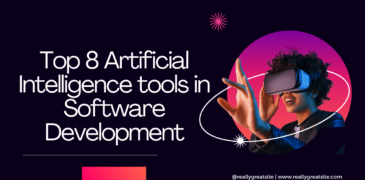In the world of software development, Artificial Intelligence (AI) tools act as smart assistants, helping developers create better and faster applications. These tools use advanced algorithms to understand patterns, make predictions, and automate tasks. Imagine having a coding partner that learns from data, identifies errors, and suggests improvements, making the development process smoother. AI tools are like tech-savvy collaborators, making it easier for developers to write efficient code and build powerful software. As technology evolves, these intelligent tools play a crucial role in shaping the future of software development, bringing innovation and efficiency to the coding process.
Top Artificial Intelligence tools in Software Development:
ChatGPT
ChatGPT, powered by OpenAI, is an advanced language model designed to engage in natural and coherent conversations. Its features encompass a broad understanding of context, enabling it to provide informative and context-aware responses. The model can be harnessed for diverse applications, from generating creative content to assisting with complex problem-solving. ChatGPT’s versatility allows users to interact seamlessly across various domains, making it a valuable tool for professionals, creatives, and learners.
The benefits of ChatGPT are evident in its ability to understand and respond to user inputs in a coherent and contextually relevant manner. It serves as a powerful writing assistant, aiding in content creation, brainstorming ideas, and refining language. ChatGPT’s vast knowledge base enables it to provide information on a wide array of topics, fostering a dynamic and informative exchange. Additionally, its capacity to adapt to different conversational styles makes it an effective and user-friendly tool for a range of communication needs. As a result, ChatGPT stands as an intelligent and accessible language model, empowering users to engage in natural and productive conversations across various domains.
Azure
Azure, Microsoft’s cloud computing platform, offers a comprehensive suite of features and benefits, making it a leading choice for businesses and developers. One key feature is its scalability, allowing users to scale resources up or down based on demand, optimizing performance and cost-efficiency. Azure’s extensive set of services includes virtual machines, databases, AI, and more, enabling diverse application development.
The platform excels in hybrid cloud capabilities, seamlessly integrating on-premises and cloud environments. This flexibility ensures a smooth transition to the cloud while accommodating specific business requirements. Azure’s robust security measures, including encryption and threat intelligence, prioritize data protection and compliance.
GitHub Copilot
GitHub Copilot, developed by GitHub in collaboration with OpenAI, is an innovative code completion tool designed to enhance the efficiency of developers. Its standout feature is the ability to generate code suggestions in real-time as developers type, leveraging advanced machine learning models. Copilot supports multiple programming languages and frameworks, making it a versatile companion for diverse coding tasks.
The tool promotes collaboration by aiding developers in understanding and using code snippets from different team members, fostering knowledge-sharing within a development team. GitHub Copilot’s integration with popular code editors streamlines its adoption into existing workflows, providing a seamless coding experience. The benefits of GitHub Copilot are profound. It significantly accelerates the coding process by offering context-aware code suggestions, reducing the need for developers to write repetitive or boilerplate code manually.
TensorFlow
TensorFlow, an open-source machine learning library developed by Google, stands at the forefront of the artificial intelligence and deep learning landscape, offering a rich set of features and benefits for developers and researchers.
Key features of TensorFlow include its flexibility and scalability, allowing users to deploy machine learning models across a variety of platforms, from edge devices to cloud servers. TensorFlow’s comprehensive ecosystem supports various machine learning tasks, including neural networks, natural language processing, and computer vision.
TensorFlow benefits from its robust community support, fostering collaboration and knowledge-sharing among developers worldwide. This vibrant community contributes to a wealth of resources, tutorials, and pre-trained models that expedite the development process.
IBM Watson
IBM Watson, an artificial intelligence (AI) platform, is renowned for its advanced capabilities and comprehensive suite of features, driving innovation across various industries. One key feature is its natural language processing, allowing Watson to understand and analyze human language. Enabling applications for sentiment analysis, chatbots, and language translation.
Watson’s machine learning capabilities empower businesses to derive insights from vast datasets, enhancing decision-making processes. The platform’s cognitive computing capabilities enable it to reason, learn, and adapt, making it a powerful tool for complex problem-solving scenarios.
Google Cloud
Google Cloud is a leading cloud computing platform that offers a robust set of features and benefits, empowering organizations to build, deploy, and scale applications with efficiency and innovation. Its comprehensive suite includes infrastructure as a service (IaaS), platform as a service (PaaS), and software as a service (SaaS) solutions.
One of Google Cloud’s standout features is its global infrastructure, comprising data centers across the world. This allows users to deploy applications closer to their end-users, ensuring low-latency access and enhancing overall performance. The platform’s scalability enables seamless handling of varying workloads, adjusting resources dynamically to match demand. Google Cloud’s data analytics and machine learning capabilities facilitate powerful insights and predictive modeling. With BigQuery for data analytics and AI Platform for machine learning. Organizations can derive value from their data, enabling data-driven decision-making.
PyTorch
PyTorch, an open-source machine learning library, stands out for its dynamic computational graph, making it a preferred choice for researchers and developers. Its features and benefits contribute to efficient model development, research exploration, and seamless integration into production environments.
One key feature of PyTorch is its dynamic computational graph, known as define-by-run, allowing for intuitive and flexible model construction. This dynamic nature simplifies debugging and experimentation, providing a natural interface for developers to interact with their models during development.
Copy AI
Copy.ai is an AI-powered copywriting tool that streamlines content creation. This offering a range of features that benefit businesses and individuals looking to generate compelling and high-quality written content efficiently.
One of Copy.ai’s standout features is its versatility in generating various types of content. Including blog posts, social media copy, product descriptions, and more. This broad applicability makes it a valuable tool for marketing, content creation, and communication strategies.
Copy.ai leverages advanced natural language processing (NLP) models to understand input prompts and generate coherent and contextually relevant text. Its ability to mimic different writing styles and tones ensures a personalized touch, aligning with the unique voice and brand identity of users.
Conclusion
In conclusion, Artificial Intelligence tools have revolutionized software development by offering dynamic solutions that enhance efficiency, innovation, and problem-solving. These tools, with features like intelligent code completion, predictive modeling, and advanced analytics. Empower developers to streamline processes and create sophisticated applications. The fusion of AI with software development not only accelerates coding tasks but also contributes to more informed decision-making. As these tools continue to evolve, their role in shaping the future of software development is pivotal. Driving productivity and enabling developers to navigate complex challenges with unprecedented ease and effectiveness.
Read more:







